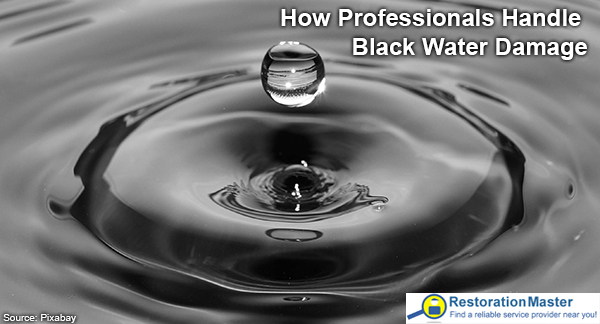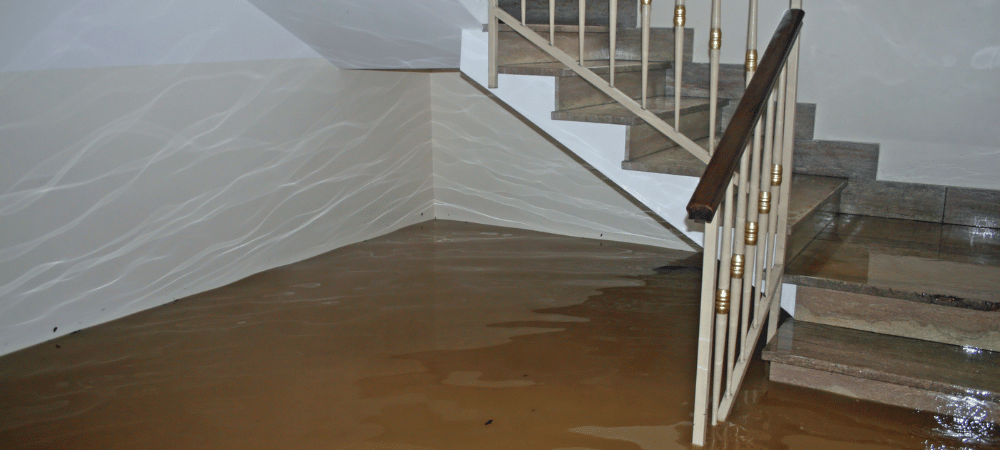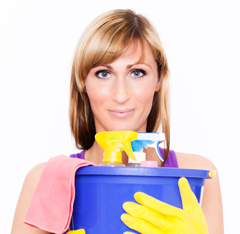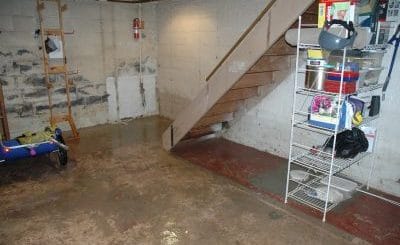How Professionals Handle Black Water Damage

Water damage is a common problem affecting both homes and businesses. It’s categorized into three types: clean, grey, and black, each signifying different levels of contaminationContamination is the presence of harmful or unwanted substan... More. Among them, black water damage is the most serious and hazardous. In this blog, we’re going to dig into the details of black water damage, figuring out why it happens, what issues it can cause, and the essential steps professional water damage restorationWater damage restoration is the professional process of clea... More experts take to clean it.
What is Black Water?
Black water damage occurs when water becomes contaminated with harmful substances like sewageSewage is wastewater containing biological and chemical cont... More, chemicals, or hazardous materials. This type of water damage is not just visibly dirty; it is genuinely unsanitary and carries significant health risks. It can originate from various sources, including sewage backups, river or stream floodingFlooding is the overflow or accumulation of water in areas t... More, or seawater intrusion. Black water serves as a carrier for bacteria, virusesViruses are microscopic infectious agents that can only repr... More, and other harmful elements, underscoring the importance of promptly addressing the issue and taking necessary precautions. In essence, it goes beyond damage to floors and carpets; it signifies the infiltrationInfiltration is the process by which water, air, or other su... More of harmful bacteria into every nook, posing risks not only to your property, but also to your well-being.
The Dangers of Black Water
Black water poses significant dangers that go beyond just impacting a home—it jeopardizes both the structureStructure refers to the framework or components of a buildin... More and the health of those inside. When black water seeps into a property, it brings in a serious level of contaminationContamination is the presence of harmful or unwanted substan... More, including sewageSewage is wastewater containing biological and chemical cont... More, chemicals, and hazardous materials. The fallout can be quite serious:
Structural Integrity
When black water makes its way into a house, it doesn’t just cause visible damage; it messes with the very structureStructure refers to the framework or components of a buildin... More of the place. The nasty elements in black water, like sewageSewage is wastewater containing biological and chemical cont... More and chemicals, start breaking down essential materials such as wood and drywall. This weakens the key parts that keep the house standing strong. If black water hangs around, it can mess with the foundation, maybe even causing it to shift or settle due to too much moisture. Metal parts, like framing and supports, aren’t spared—they can corrode and lose their strength.
Health problems
Engaging with black water goes beyond being a household inconvenience—it poses a real threat to your health. Here are the consequences you may face when encountering this hazardous substance.
Diseases Transmitted by Black Water
Black water can trigger a spectrum of illnesses and diseases, ranging from Hepatitis, Cryptosporidiosis, Gastroenteritis, Giardiasis, to Leptospirosis and wound infections. Notably, the release of endotoxins into the air from black water poses a potential risk for severe respiratory illnesses.
Symptoms of Black Water Exposure
The symptoms associated with exposure to contaminated water include:
- Vomiting
- Diarrhea
- Stomach cramps
- Fever, and headaches
In severe cases, individuals face an elevated risk of developing pneumonia, meningitis, and other health complications. It is noteworthy that black water, in addition to these risks, can also harbor fungiFungi are a group of organisms, including mold, mildew, and ... More such as Penicillium and Aspergillus, posing a potential threat to respiratory health by contaminating the air.
Mold and Mildew
Black water isn’t just a threat to your home; it opens the door to moldMold is a type of fungus that grows in damp or humid conditi... More and mildewMildew is a type of fungus that grows on damp surfaces, typi... More issues. When this contaminated water infiltrates your space, it not only carries harmful elements but also brings in excess moisture. And you know what thrives in moisture? MoldMold is a type of fungus that grows in damp or humid conditi... More and mildewMildew is a type of fungus that grows on damp surfaces, typi... More. They begin to flourish on your walls, floors, and ceilings, causing visible damage and releasing sporesSpores are microscopic reproductive units of fungi or mold t... More into the air. Inhaling these sporesSpores are microscopic reproductive units of fungi or mold t... More can affect your respiratory system and trigger allergies.

Immediate Steps to Take Upon Discovering Black Water Damage
Upon identifying black water damage, it’s necessary to act quickly to reduce risks and prevent additional harm. Here are the essential steps to take:
- Turn off the electricity in the affected area. Water and electricity are a dangerous combination.
- Immediately reach out to water damage restoration professionals as they know how to handle black water incidents.
- Take photographs or videos of the affected areas and damaged belongings.
- Keep children, pets, and older adults away from the affected zone.
- Determine the source of the black water and take measures to stop its entry.
- Shut all doors separating the affected zone from the rest of the house.
- Minimize walking or moving items within the affected area to prevent the spread of contaminants.
How Professionals Address Black Water Damage
When it comes to tackling the aftermath of black water damage, you can trust the water damage restorationWater damage restoration is the professional process of clea... More experts. They’ve got the skills and know-how to handle the complexities of restoring spaces and making sure everyone stays safe. As soon as these water damage restorationWater damage restoration is the professional process of clea... More pros arrive, they kick things off with a clear plan to minimize the damage and get the restorationRestoration is the process of returning a property to its pr... More process in motion. Here’s a look at the essential steps they take:
- InspectionInspection is the careful examination and assessment of a pr... More: First off, the professionals carefully check how much damage the nasty black water has done. They figure out which areas got hit, see if the buildings are still standing strong, and check how dirty things are. Safety comes first, so they gear up in protective gear to stay safe during the cleanup.
- Water Mitigation and Cleanup: Next, they use heavy-duty tools to quickly suck up all that gross black water. This stops more damage and keeps moldMold is a type of fungus that grows in damp or humid conditi... More and bacteria from causing trouble. They make sure to clean and sanitize everything thoroughly to restore safe conditions.
- DryingDrying is the process of removing moisture from materials, s... More and DehumidificationDehumidification is the process of reducing and controlling ... More: To make sure things don’t get moldy, the experts use industry recognized tools like dehumidifiers to dry out walls, floors, and whatever else got wet. This step is essential to prevent more damage and keep the place sturdy.
- Content RestorationRestoration is the process of returning a property to its pr... More: After that, they go through all the stuff that got soaked. If something can be saved, they clean it up and make it good as new. They work closely with the owners to keep track of what’s damaged, making it easier for insurance claims.
- Mold RemediationMold remediation is the process of identifying, removing, an... More: Because black water can leadLead is a heavy metal that can be toxic to humans, especiall... More to moldMold is a type of fungus that grows in damp or humid conditi... More, the experts do a careful check, stop moldMold is a type of fungus that grows in damp or humid conditi... More from spreading, and get rid of anything contaminated. They want to make sure the place is safe and mold-free.
- RestorationRestoration is the process of returning a property to its pr... More and RepairRepair is the act of fixing or restoring damaged property, m... More: After everything’s tidy and dry, it’s time to fix things up. These experts repairRepair is the act of fixing or restoring damaged property, m... More or change anything that got damaged—like the building, floors, and walls.
Call the Professionals for Water Damage Restoration
For immediate and reliable water damage restoration services, call the professionals immediately. Water damage restorationWater damage restoration is the professional process of clea... More experts are ready to respond promptly to any water-related emergencies, ensuring an efficient and effective restorationRestoration is the process of returning a property to its pr... More process. Whether it’s day or night, these experts are equipped to handle the situation with urgency and professionalism. You can count on a responsive and thorough approach to water damage restorationWater damage restoration is the professional process of clea... More, helping you regain control and restore your property to its pre-damage condition.












